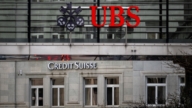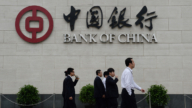【新唐人2011年12月27日訊】今年,面對國內嚴重的通貨膨脹和經濟過熱,大陸當局不得不收緊銀根、將經濟發展降速,而歐元區和美國經濟的持續低迷,又讓中國的出口產業備受打擊。對於即將到來的2012年,面臨內憂外患的中國經濟將往何處去?是否能夠實現軟著陸?專家和普通民眾都非常關注。
因為出口的疲軟、原材料等生產成本的上漲,中國大陸的很多中小企業不堪重負,已經倒閉或變相倒閉。而倖存的企業現在又面臨年關的困境,需要償還貸款、發放工資、清還供應商貨款。
《美國之音》報導指出,貸款困難、生產成本增加,對大陸中小企業構成很大的衝擊,有些恐怕很難熬過這個中國新年。
外需大幅下滑,出口企業困境重重。作為中國經濟最主要內需支撐點的房地產業,目前也是一片蕭條。
英國《金融時報》中文網報導,大陸的房市降價潮開始從一線城市開始向二、三線城市蔓延,內蒙古鄂爾多斯的房價出現了大約5到7成的下跌,大量商品房無人居住,成為一座“鬼城”。
中國經濟現狀如此,那麼在即將到來的2012年,中國經濟到底能不能實現「軟著陸」呢?
美國「南卡羅來納大學」艾肯商學院教授謝田:「很多海內外經濟學家都認為,中國經濟會實現硬著陸,有可能會出現經濟的崩潰、崩盤。因為如果要軟著陸的話,有幾個要素。一個是要保持適度的經濟增長,然後呢,通貨膨脹不能夠失控,但現在看來,這兩點都是很困難的。」
謝田深入分析指出,中共在最近的經濟工作會議上確定,2012年的目標是「保增長」,這是中共為降低失業率、維持政權穩定而作出的決定。
謝田:「保持增長的話,它一定要繼續加大刺激經濟的投入、基礎建設的投入,所以呢,很可能幾萬億的投入進去以後,我們可以預計,它這個防止通貨膨脹的目標實際上是不會實現的。」
謝田強調,通脹除了造成民怨加大之外,還使老百姓的購買力降低,內需市場不振。而歐美等國的經濟短期很難復甦,中國出口萎縮的現狀無法改善。這樣,中國經濟將出現滯漲的困境,無法「軟著陸」。
「北京天則經濟研究所」副所長馮興元則表示,當局不會讓中國經濟最大的支撐點——房地產出現崩盤,雖然出口受創,中國經濟還是有可能「軟著陸」。
馮興元:「但是我們房地產的需求還是很強勁的,如果這個信貸控制放鬆的話,房地產這方面的投資還是有很大的空間的。」
「諾貝爾經濟學獎」得主保羅•克魯格曼(Paul Krugman)撰寫了一篇評論指出,與上世紀80年代末的日本或者2007年的美國類似,中國大陸當前的景象非常危險:信貸迅速增長﹔經濟增長過度依賴高漲的房價,並且出現所有的泡沫化跡象。他認為,中國正在成為世界經濟的另一個危險點,有理由擔心中國的金融和經濟危機會發生。
新唐人記者劉惠、李謙、李月採訪報導。
Stagflation or Soft Landing—-Which will it be for China in 2012?
Facing severe domestic inflation and an overheating economy,
the Chinese Communist Party (CCP ) has tightened money supply and decelerated economic growth.
However, continual recession in the eurozone and in the U.S.
has hardly hit China’s export industry.
In 2012, to what situation will China’s economy move forward?
Will it achieve a soft landing? The issues arouse public concerns.
Due to weak exports and soaring production costs,
numerous business failures of small and medium enterprises
have emerged in China.
Surviving companies now face a year-end plight, such as
loan repayment, salary payment, paying off debts to suppliers.
As The Voice of America pointed out, difficult loaning,
increased production costs, all hit China’s small and medium businesses hard.
Some of them might find it difficult to get through the coming
Chinese New Year.
China’s export faces hardship owing to the sharp drop
in external demand.
As the most important driver for domestic demand, China』s
property industry is currently in a recession, too.
According to the UK’s Financial Times Chinese edition reports,
China’s tidal wave of cut housing prices has moved forward
to second-tier and third-tier cities, from first-tier cities.
In Erdos city, Inner Mongolia, housing prices plunged
by 50%-70%, with massive numbers of houses unoccupied. The city has become a “ghost town".
In 2012, will China’s economy achieve a soft landing?
Professor from the University of South Carolina-Aiken, Frank
Tian Xie says, “Many economists in China and overseas
believe that China’s economy will suffer a hard landing,
with the possibility of economic collapse.
To achieve a soft landing needs several factors.
One is that a moderate economic growth should be maintained.
Also that, inflation cannot be out of control.
But now it looks like it will be difficult to pull off both. “
Xie says that recently, the CCP regime clearly set out
its 2012 goal that is, to “maintain growth".
The goal is made in consideration of reducing unemployment
and to maintain its political stability.
Frank Tian Xie says: “To maintain growth needs more economic
stimulus investments on the infrastructure constructions.
We estimate it’s very likely that after throwing trillions in
investments, It’s goal to curb the inflation will fail in reality."
Xie emphasizes that inflation has fueled the public』s
discontentment,
moreover, it has lowered people’s purchasing power,
causing a weak domestic market.
As in the short-term, a recovery is hard to see in Europe
and in the U.S.,
while China’s export decline situation cannot be improved
currently,
thus, China will be caught in the stagflation trap,
and therefore a soft landing will be impossible.
Deputy Director at Beijing-based Uni-rule Institute of
Economics, Feng Xingyuan, thinks that
the CCP regime will not let this happen — the real estate』s
collapse, as the property market has been the largest support point for China’s economy.
Feng says although export is shrinking,
it is still possible to see a “soft landing" ahead for China.
Feng Xingyuan says: “But we still have very strong demand
in real estate.
If they ease credit control, the space in real estate
investment is still very big."
In a commentary, Nobel-Prize winner Paul Krugman points
out that similar to the situation in Japan
at the end of the 1980s or that in the U.S. in 2007,
the current scene in China is very dangerous:
there is rapid growth in credit, economic growth has relied on
a huge construction boom fueled by surging real estate prices, showing all the classic signs of a bubble.
Krugman thinks that China is emerging as another danger spot
in the world economy, there are real reasons to fear financial and economic crisis.
NTD reporters Liu Hui, Li Qian and Li Yue





























